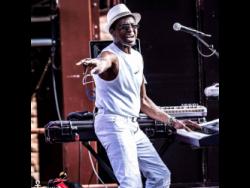
IN THE midst of Marley75, a year-long celebration in 2020 of what would have been the 75th birthday of Robert Nesta ‘Bob’ Marley, there also comes the day that many would rather not have happened – May 11, the day Marley died. But, just like the day of his birth, it is a time to pause and pay tribute to the King of Reggae.
Percussionist Bernard ‘Touter’ Harvey, a musician who played on seven of Marley’s albums, among them No Woman No Cry, Natty Dread and Legend, shared with The Gleaner what defined Bob the man and made him so special. But first, Harvey had to recall where he was on May 11, 1981, when he got the news of Marley’s death. “I was in a Holiday Inn in Chicago when I heard of Bob Marley’s passing. Jacob (Miller) had passed away less than a year ago. It was very devastating. We knew he was going down, but we didn’t expect it so quickly,” the experienced musician, engineer and producer said.
Harvey, who regrets missing out on Bob’s trip to Zimbabwe, having been forced to turn down a last-minute invitation from Marley, later got a second chance to tour with the reggae legend, but that too, never materialised. “The last call I got from Bob was to come to New York after the Madison Square Gardens concert to fill in for Wya, (one of the band members). They had been rehearsing here in Miami for the concert, and I went to the rehearsal to catch up with them and the groove was still there. So when he needed a keyboard player, Bob sent for me. I packed my bags and went to New York, but when we were at Danny Simms’ house we got the news that the tour had been cancelled because Bob had fallen ill.”
The percussionist hailed Marley’s creativity and his skills at interpreting and connecting with regular folk.
“Bob could interpret his material in a sense that everybody could understand. He was singing common songs about common people. Take for example, Small Axe, simple lyrics but very deep,” he said. Harvey points out that Marley was making a subliminal reference to Coxsone, Federal and Dynamics, the ‘Big Three’ record labels in Jamaica at the time. “He was saying that we independent label are the small axe ready to cut you down. Many of the songs are like that, personal to him, but resonate with the populace,” Harvey, who has spent several decades with Inner Circle, and is still a part of the group, explained.
Giving another example, he mentioned that in the 12 Tribes of Israel, the Rastafarian group with which Marley was associated, the leader Gadman would always say, ‘Are you picking up?’ meaning, do you understand what I’m saying? Bob Marley used the same expression in Rastaman Vibrations and that line became so popular.
For Harvey, working in the studio with Marley was like going to university. “I really enjoyed working with Bob. It was going to school, and it was also quite a bit of experimenting. Bob stressed ‘create’ and that’s why the riddim tracks from 1978 still sound so fresh to this day. The first time I learnt about overdubbing multiple tracks was from a session with him. Bob Marley ting was a very positive ting,” Harvey said.
STILL INFLUENTIAL
Thirty-nine years after his death, Bob Marley’s music is still impacting the world and continues to influence new generations. His song, One Love, was voted the best song of the 20th century, while his 1977 album, Exodus, which stayed on the UK’s music chart for 56 consecutive weeks, was voted the Greatest Album of the Century by the US based TIME magazine. In his book, Catch a Fire: The Life of Bob Marley, author Timothy White describes Marley as “ the most charismatic emissary of modern Pan-Africanism”.
In one of his memorable interviews, Marley stated, “If I never played music I couldn’t see myself doing anything else. Many people think reggae music will end soon, but the music is Rasta music and therefore has no end.”
In 1981, Robert Nesta Marley was awarded Jamaica’s third-highest honour, the Order of Merit, for his outstanding contribution to Jamaican culture. As a mark of the highest respect, he also received an official funeral from the Government of Jamaica.